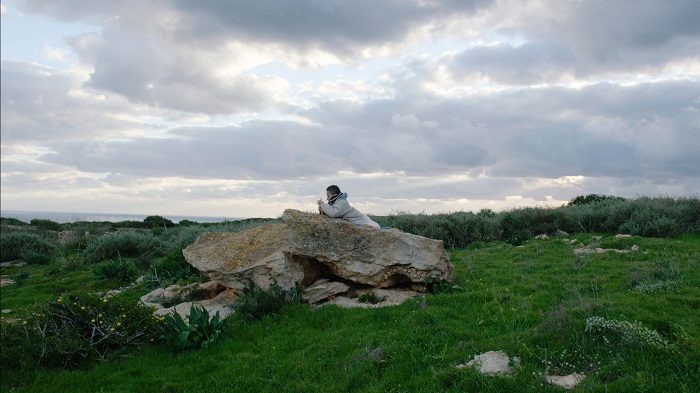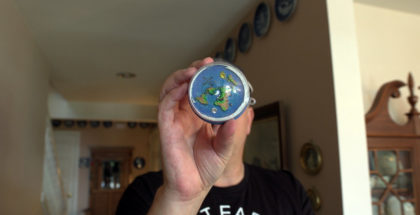VOD film review: Fire at Sea
Review Overview
Images
10Juxtaposition
10Impact
10Martyn Conterio | On 10, Jun 2016
Director: Gianfranco Rosi
Cast: Samuele Caruana, Mattias Cucina, Guiseppe Frangapane, Francesco Paterna
Certificate: 12A
Watch Fire at Sea online in the UK: MUBI UK / Curzon Home Cinema / Apple TV (iTunes) / Prime Video (Buy/Rent) / TalkTalk TV / Rakuten TV / Google Play
Winner of this year’s Golden Bear prize at the 66th Berlinale, Gianfranco Rosi’s Fire at Sea (Fuocoammare) is the perfect counter argument to every sensationalist news item fixated on presenting the desperation of refugees as a foreign invasion based on economic opportunism. Also a neorealist-like portrait of a young lad living on the tiny island of Lampedusa, part of Italy but geographically closer to the African continent, Fire at Sea is a daring and virtuosic exploration of a modern humanitarian crisis.
150 miles south of Sicily and lying 70 miles off the Libyan coast, Lampedusa is a fishing community and the largest of the Pelagie Islands. Lampedusa is known widely today as it is used by the Italian government as an overstretched processing centre for refugees saved from drowning in the Med by a beleaguered Italian navy.
Paying thousands of dollars to human traffickers for passage to Europe on boats not fit for purpose, passengers are crammed like sardines below and above deck. These rickety fishing vessels – some are little more than dinghies – head out into the ocean, only to capsize or sink. Over 10,000 men, women and children have perished attempting to reach Europe. Maybe even more.
Fire at Sea is not presented as a polemic, however. It’s much cleverer than that. Rosi has made a lyrical portrait of life in that part of the world, through the use of stark contrasts; two realities, almost invisible to one another, but very much co-existing side by side.
It is clear all scenes with 12-year-old Samuele – the film’s main focus and central figure – are staged, and that he enjoys the attention of the camera. Samuele goes to school, hangs out with his friend (they love blasting cacti with their slingshots or blowing them up with fire crackers), hunts birds and, in one near-disastrous sequence, attempts to prove his sea legs by taking out a rowing boat into the harbour. The kid almost ends up wedged between two navy ships and crushed to death.
During these episodes, other aspects of Fire at Sea feel invisible or disconnected. Yet Rosi interrupts the flow of Samuele’s narrative by returning to the drama on the waves. The refugee episodes serve as an almost unreal backdrop to sedate life on the island, as a horror movie on Lampedusa’s doorstep and a metaphor for wider European ignorance to the horrible realities of those less fortunate.
Although Samuele’s lack of knowledge or concern might insinuate islanders do not care about the plight of those in the centre, they do not interact with them, by and large, because they’ve very little opportunity to do so. People are rescued and processed straight away. They are confined there. In an early scene, Samuele’s grandma listens to a news broadcast on the wireless, detailing the latest tragedy and loss of life. She intones ‘poor souls’ in the same way we all do, when watching the nightly news. Then, we get back to making dinner.
It must have been tremendously difficult for Rosi and his crew filming people being rescued, or when they’re taken off the buses at the detention centre. The process is dehumanising, certainly. Authority figures are often dressed in biohazard gear, their facelessness adding to a mood of ill-ease and even unreality. Burly coppers at the detention centre are neither kind or mean. They’re just processing individuals one after the other, commenting occasionally on the state of people’s clothes or ordering them to go this way or that. There is an irony at play, here. While the refugees are not exactly welcomed with open arms by Italian authorities and treated with little more than a basic courtesy (and that’s maybe because cameras are present), what’s more important is that they are alive and safe.
Make no mistake, there are truly awful moments peppered throughout. Babies and children sat amid corpses, oblivious to the peril they are in. Men stretched out and dehydrated to the point of death, their stomachs contracting rapidly as they fight for every breath. Doctors talk among themselves, wondering what to do because some victims they think are beyond saving. Dead bodies piled higgledy-piggledy in cargo holds, having suffocated on diesel fumes and left to rot. Others are riddled with appalling chemical burns.
One criticism levelled at Rosi, an unfair one, is that the survivors are treated like curiosity objects by the camera. If Fire at Sea tried to obtain interviews with traumatised people, as soon as they’ve hit land, the filmmaker would have been resorting to the kind of sensationalism beloved by the media. Rosi has stated, too, he simply had no time to build relationships with those in the detention centre, either refugees or those in charge.
To counter such disturbing vignettes, Rosi interviewed the island’s doctor, Pietro Bartolo. He is first introduced delivering an ultrasound examination to a pregnant woman expecting twins. His trying to communicate with her through broken English will draw tears, but also gives the viewer – and the film – a resounding glimpse of human decency that some might, elsewhere, find suspicious. Fire at Sea’s humanity should never be in question because Bartolo represents it magnificently. His second big scene sees the good doctor discussing the burden of duty and recurring nightmares suffered. Images conjured by his words would be at home in Dante’s Inferno. Bartolo also gets to meet Samuele in a good-humoured exchange in the third act, the little boy worried by his health and the doc reassuring him he’s doing just fine.
Rosi doesn’t need to scream “Oh, the humanity!” To do so would make Fire at Sea feel like a lesser work giving in to calculated histrionics and cheap sentimental gestures. Instead, it makes its points through sheer cinematic craft, subtlety and the poetry of imagery and juxtaposition. Wholly committed to the sickening reality often obscured by television censorship, Rosi’s award-winner is one of the most essential viewing experiences of 2016.
About Endlessness is now available on MUBI UK, as part of a £9.99 monthly subscription.






















